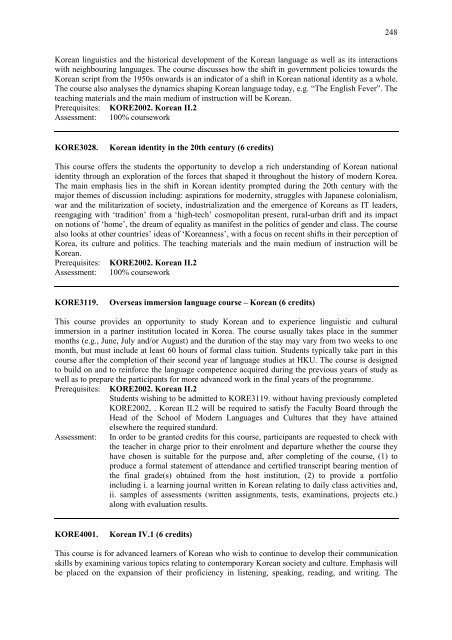(BA) (4-year-programme) - The University of Hong Kong
(BA) (4-year-programme) - The University of Hong Kong
(BA) (4-year-programme) - The University of Hong Kong
You also want an ePaper? Increase the reach of your titles
YUMPU automatically turns print PDFs into web optimized ePapers that Google loves.
248Korean linguistics and the historical development <strong>of</strong> the Korean language as well as its interactionswith neighbouring languages. <strong>The</strong> course discusses how the shift in government policies towards theKorean script from the 1950s onwards is an indicator <strong>of</strong> a shift in Korean national identity as a whole.<strong>The</strong> course also analyses the dynamics shaping Korean language today, e.g. “<strong>The</strong> English Fever”. <strong>The</strong>teaching materials and the main medium <strong>of</strong> instruction will be Korean.Prerequisites: KORE2002. Korean II.2Assessment: 100% courseworkKORE3028.Korean identity in the 20th century (6 credits)This course <strong>of</strong>fers the students the opportunity to develop a rich understanding <strong>of</strong> Korean nationalidentity through an exploration <strong>of</strong> the forces that shaped it throughout the history <strong>of</strong> modern Korea.<strong>The</strong> main emphasis lies in the shift in Korean identity prompted during the 20th century with themajor themes <strong>of</strong> discussion including: aspirations for modernity, struggles with Japanese colonialism,war and the militarization <strong>of</strong> society, industrialization and the emergence <strong>of</strong> Koreans as IT leaders,reengaging with ‘tradition’ from a ‘high-tech’ cosmopolitan present, rural-urban drift and its impacton notions <strong>of</strong> ‘home’, the dream <strong>of</strong> equality as manifest in the politics <strong>of</strong> gender and class. <strong>The</strong> coursealso looks at other countries’ ideas <strong>of</strong> ‘Koreanness’, with a focus on recent shifts in their perception <strong>of</strong>Korea, its culture and politics. <strong>The</strong> teaching materials and the main medium <strong>of</strong> instruction will beKorean.Prerequisites: KORE2002. Korean II.2Assessment: 100% courseworkKORE3119.Overseas immersion language course – Korean (6 credits)This course provides an opportunity to study Korean and to experience linguistic and culturalimmersion in a partner institution located in Korea. <strong>The</strong> course usually takes place in the summermonths (e.g., June, July and/or August) and the duration <strong>of</strong> the stay may vary from two weeks to onemonth, but must include at least 60 hours <strong>of</strong> formal class tuition. Students typically take part in thiscourse after the completion <strong>of</strong> their second <strong>year</strong> <strong>of</strong> language studies at HKU. <strong>The</strong> course is designedto build on and to reinforce the language competence acquired during the previous <strong>year</strong>s <strong>of</strong> study aswell as to prepare the participants for more advanced work in the final <strong>year</strong>s <strong>of</strong> the <strong>programme</strong>.Prerequisites: KORE2002. Korean II.2Students wishing to be admitted to KORE3119. without having previously completedKORE2002, . Korean II.2 will be required to satisfy the Faculty Board through theHead <strong>of</strong> the School <strong>of</strong> Modern Languages and Cultures that they have attainedelsewhere the required standard.Assessment: In order to be granted credits for this course, participants are requested to check withthe teacher in charge prior to their enrolment and departure whether the course theyhave chosen is suitable for the purpose and, after completing <strong>of</strong> the course, (1) toproduce a formal statement <strong>of</strong> attendance and certified transcript bearing mention <strong>of</strong>the final grade(s) obtained from the host institution, (2) to provide a portfolioincluding i. a learning journal written in Korean relating to daily class activities and,ii. samples <strong>of</strong> assessments (written assignments, tests, examinations, projects etc.)along with evaluation results.KORE4001.Korean IV.1 (6 credits)This course is for advanced learners <strong>of</strong> Korean who wish to continue to develop their communicationskills by examining various topics relating to contemporary Korean society and culture. Emphasis willbe placed on the expansion <strong>of</strong> their pr<strong>of</strong>iciency in listening, speaking, reading, and writing. <strong>The</strong>
















